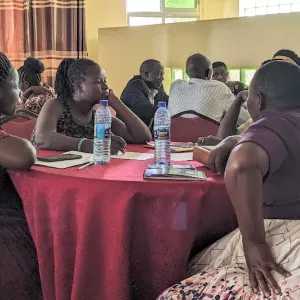Co-design workshop on consumption traits to inform improved seed promotion
Bjorn Van Campenhout, Leocardia Nabwire On Monday February 6th, a co-design workshop was organized in Iganga, Uganda. The objective of the workshop was to get ideas for the design of an intervention that highlights consumption-related traits of improved seed varieties, which in turn is expected to increasing varietal turnover of seed among smallholder farmers. The workshop was attended by District

Co-design workshop on consumption traits to inform improved seed promotion
Bjorn Van Campenhout, Leocardia Nabwire
On Monday February 6th, a co-design workshop was organized in Iganga, Uganda. The objective of the workshop was to get ideas for the design of an intervention that highlights consumption-related traits of improved seed varieties, which in turn is expected to increasing varietal turnover of seed among smallholder farmers.
The workshop was attended by District Agricultural Officers, scientists from the National Agricultural Research Organization (NARO), extension officers, maize farmers, agro-input dealers, traders, and maize processors. Furthermore, after the workshop, we also organized a series of Focus Group Discussions (FGDs) with maize farmers in the district of Kamuli to triangulate some of the conclusions.
The intervention is part of a larger research program (Market Intelligence Initiative – Work Package 3 on Behavioral Intelligence) that looks at both production and consumption related traits of improved seed varieties in different countries. The overall hypothesis is that farmers are unaware of the properties of these new technologies, and pointing out advantages both in terms of production (eg. higher yield) and consumption (eg better taste) will spur adoption. While the intervention on the production side has already been agreed upon—providing farmers with free maize seed trial packs-the consumption side intervention still need to be designed. This is also an area in which far less empirical work has been done so far, since most studies evaluating strategies to promote technology adoption focus on traits and constraints on the producer side.
During the workshop, one of the things we did was asking participants to first list and rank particular traits that farmers find important when deciding about planting maize, and group them under the headings of production and consumption. Then we ask what farmers think is important when they are consuming products derived from maize, such as posho, a kind or maize meal porridge. Farmers generally agreed that yield is a key production attribute. Other attributes included common traits such as drought resistance, pest resistance (in particular against striga, a parasitic weed that is common in the area, etc). No surprises here.
Perhaps also not surprising, among the preferred consumption traits, palatability also ranked at the top. More surprising, the degree to which maize flour expands when preparing posho was also often mentioned. In a way, the yield attribute on the production side seems to be mirrored when maize flour is consumed, as farmers can get more food from the same amount of flour.
We also uncovered an interesting gender difference when consumption traits were ranked. Particularly women seemed to indicate that “expansion” is a preferred trait; men were more interested in “taste”. While this can partly be explained by the fact that women cook and men may not be aware of the importance of “expansion” as a trait, it was also argued that women are more concerned about the number of mouths to feed; men do not have to worry about having sufficient food – the patriarch is always served first!

